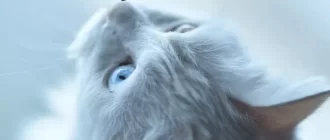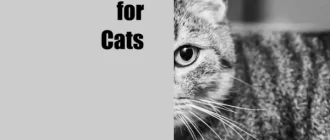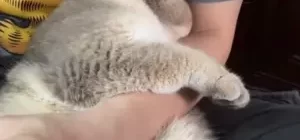Pepto-Bismol, a well-known treatment for stomach problems in humans, contains Bismuth Subsalicylate as its main active ingredient. Although it is sometimes used by veterinarians to treat minor stomach issues such as inflammation, diarrhea, and indigestion in dogs, it is not considered safe for cats. The salicylates in Pepto-Bismol, which are also found in aspirin, can be harmful to cats, as they are highly sensitive to these substances.
- Bismuth Subsalicylate provides anti-inflammatory, mild-antibiotic, antacid, and protective qualities.
- Pepto-Bismol is not recommended for cats due to their sensitivity to salicylates.
- The presence of Helicobacter bacteria, which can cause ulcers in humans, remains unresolved in pets.
- Veterinary guidance and supervision are essential when administering Pepto-Bismol to cats.
Using Pepto-Bismol safely for cats
Bismuth subsalicylate and its effects on cats
Bismuth subsalicylate, commonly found in medications like Pepto-Bismol and Kaopectate, is primarily used to treat minor stomach issues such as inflammation in dogs and cats. However, it’s essential to use it carefully with cats due to its salicylate content, which is the active ingredient in aspirin and can be harmful to them. Here is a guide to understanding the effects of bismuth subsalicylate on cats:
- The compound can decrease inflammation caused by intestinal infections due to its aspirin-like properties.
- It may suppress bacteria that cause ulcers, like Helicobacter, although its significance in pets is not fully understood.
- Cats may experience slow elimination of salicylate compounds, so it’s crucial not to exceed recommended doses.
- Bismuth subsalicylate should be used with caution and under a veterinarian’s guidance.
- It may interact with other medications, such as tetracycline, steroids, non-steroidal anti-inflammatory drugs, and aspirin.
- Bismuth subsalicylate can cause a darkening of a cat’s bowel movements, which pet owners should be aware of.
The anti-inflammatory benefits of Pepto-Bismol
- Understand Components: Know that Bismuth Subsalicylate, the active ingredient in Pepto-Bismol, has anti-inflammatory, mild-antibiotic, antacid, and protective qualities.
- Recognize Uses: Pepto-Bismol is commonly used in humans to treat indigestion and diarrhea. It is sometimes used by veterinarians to treat similar symptoms in dogs, but it is not safe for cats.
- Bacterial Protection: The bismuth component of Pepto-Bismol has weak antibacterial qualities against bacteria such as Heliobacter, which can benefit your pet’s health.
- Antiprostaglandin Effect: The salicylate component, similar to aspirin, can help treat some types of diarrhea by reducing the secretion of fluids in your pet’s system.
Caution: Never administer Pepto-Bismol to cats, as it is not considered safe for their consumption. Always consult your veterinarian before using any medication on your pets and follow their guidance for proper usage and dosage.

Recommended dosage of Pepto-Bismol for cats
It is essential to understand that Pepto-Bismol contains salicylates, the active ingredient in aspirin, which is toxic to cats. Therefore, administering Pepto-Bismol directly to cats is not recommended. Instead, consult your vet for alternative medications that are safe for your cat.
If your vet still advises Pepto-Bismol use, follow these steps:
- Consult your veterinarian to determine the correct dosage based on your cat’s weight, age, and health condition.
- Make sure you are giving Pepto-Bismol only as prescribed by the vet, as exceeding the dosage can have toxic effects on cats.
- Check the formulation of Pepto-Bismol to ensure it does not list salicylates as an active ingredient.
- Keep a close eye on your cat for any possible side effects or allergic reactions. If you notice any unusual behavior or symptoms, immediately inform your veterinarian.
- Report any changes in your cat’s bowel movements to your vet, as the bismuth compound can cause discoloration.
| Cat Weight | Dosage |
|---|---|
| Under 5 lbs | 1/4 teaspoon every 6-8 hours |
| 5-10 lbs | 1/2 teaspoon every 6-8 hours |
| Over 10 lbs | 3/4 teaspoon every 6-8 hours |
Possible side effects of Pepto-Bismol for cats
Pepto-Bismol, which contains the active ingredient bismuth subsalicylate, is commonly used in humans to treat indigestion and diarrhea but is not safe for cats. Possible side effects of Pepto-Bismol for cats include:
- Gastric bleeding: The salicylates in Pepto-Bismol, similar to aspirin, can cause gastric bleeding in some pets when used without close monitoring.
- Overdose risk: Applying Pepto-Bismol to hot spots can lead to a subsalicylate overdose if the cat licks it off.
- Interaction with other medications: Pepto-Bismol can increase the risk of abnormal bleeding in cats on anticoagulants and reduce the efficacy of tetracycline antibiotics such as doxycycline.
- Adverse effects in pregnant or nursing cats: Pepto-Bismol is detrimental to feline fetuses or nursing kittens.
- Potential for GI ulceration: Pepto-Bismol can cause gastric ulcer disease in pets, especially when combined with aspirin, NSAIDs, or steroids like prednisone.
- Interference with laboratory tests: Pepto-Bismol may lead to incorrect results on urine glucose and ketone tests.
- Difficulty in diagnosing more severe issues: Pepto-Bismol can create black stools that mimic melena (digested blood in stool), making it challenging to distinguish between a harmless pigment change and a more serious gastrointestinal problem.
Alternatives to Pepto-Bismol for cats
- Kaolin and Pectin: The older formulation of Kaopectate contains Kaolin and Pectin, which can help in treating minor stomach problems in cats. However, ensure to check the formulation and avoid using any product containing salicylates.
- Probiotics: Giving your cat probiotics can help restore balance in their gut and can alleviate symptoms of indigestion and diarrhea.
- Slippery Elm Bark: This herbal remedy can soothe the digestive tract and help with diarrhea and constipation.
Remember, it’s crucial to consult with your veterinarian before administering any over-the-counter medication or alternative remedy to your cat, as they can provide specific guidance based on your cat’s health and needs.
Veterinary guidance when administering Pepto-Bismol to cats
While Pepto-Bismol is commonly used to treat stomach issues in humans and dogs, it’s crucial to exercise caution when administering it to cats. Here’s a step-by-step guide to ensure the safe use of Pepto-Bismol for your feline friends:
- Consult your veterinarian: Always discuss any treatment plans with your vet before administering Pepto-Bismol to your cat for stomach issues.
- Check the formulation: Make sure your Pepto-Bismol or Kaopectate formulation does not contain salicylates, as they can be harmful to cats.
- Follow the recommended dosage: If your veterinarian deems it safe to use, strictly adhere to the prescribed dosage and schedule.
- Monitor your cat closely: Keep an eye out for potential side effects or signs of complications, such as darkened bowel movements.
- Maintain communication with your vet: If your cat’s vomiting or diarrhea persists for more than 24 hours, immediately seek your veterinarian’s attention for further advice.
Pepto-Bismol should only be used under the direct supervision and guidance of a veterinarian. It is essential to prioritize your cat’s safety and overall health during the treatment process.
AetaPet.com states, that treatment of cats with Pepto-Bismol should be avoided, as the risk of harm to the health of the pet is quite high.





